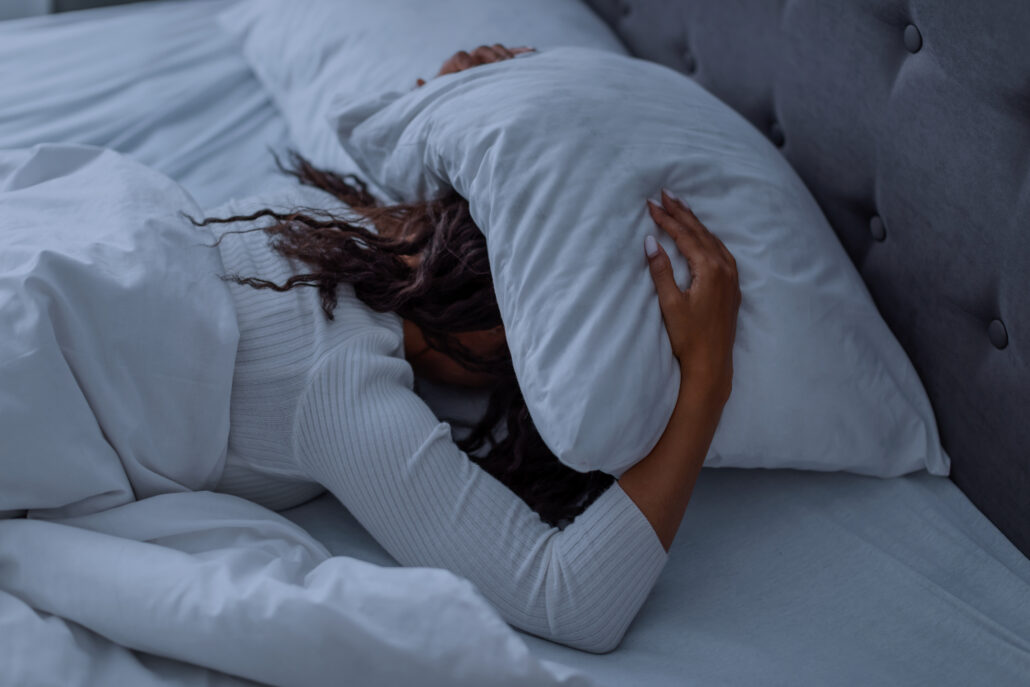Stress and Sleep – What Is Keeping You Up At Night?
Stress and sleep go together like oil and water. Getting a good night’s sleep is essential for our physical and mental health, yet many people struggle with falling and staying asleep.
According to Better Sleep Council research, the top impediments to a good night’s sleep vary by age. Boomers and GenXers are more likely to say body pain impedes their sleep while worrying about money is the most common sleep obstruction among Gen Zs and Millennials.
For many, stress is a common culprit, among many, that can disrupt sleep patterns, leading to a decline in our health, moods, and performance. It’s also a top factor affecting sleep for people of all generations. However, there are other factors that can keep us awake at night too. In this blog, we’ll explore the top three factors affecting each generation’s sleep and provide “pro tips” for getting a better night’s sleep.
So, let’s dive into the common sleep busters by generation and learn four tips for a better night’s rest!
Stress and Sleep: Generational Factors
Stress can make it difficult to fall asleep and cause disruptions in sleep patterns. This will often trigger the body’s stress response, leading to elevated levels of stress hormones further disrupting sleep and negatively impacting learning, memory, metabolism, and endocrine function.
Understanding how stress affects sleep is key to improving your quality of sleep and overall health and well-being, but it’s also important to recognize that different generations face unique obstacles when trying to get a good night’s rest. Boomers and GenXers often struggle with body pain, while younger generations like Gen Z and Millennials are more likely to be kept up by financial worries. That’s why understanding these generational sleep stressors is crucial in developing effective strategies to improve sleep quality and overall well-being for people of all ages.
Gen Z
Specifically, Generation Z (18- to 24-year-olds) shared that of the top impediments to a good night’s sleep:
39% report worrying about money or finances
36% report being too warm
34% report being too cold
Sleep Tip #1: Keep Stress Out of the Bedroom
When you’re stressed about money or finances, working overtime at your job or trying to balance school and work, it can feel like the only time and place you can get your work done is in bed. However, it’s important to keep in mind that studying and working in bed can create a negative association between the bed and activities other than sleep. This negative association can lead to difficulties falling and staying asleep and decreased sleep quality because your brain starts to associate the bed with active, stressful thoughts instead of calming, relaxing sentiments.
Millennials
Millennials (25- to 39-year-olds) were also divided on what major factors were disrupting their sleep, specifically:
38% report worrying about money or finances
34% report disturbances from body pain or aches
33% report being too warm
Sleep Tip #2: Work It Out
Dealing with financial stress? One beneficial way to work through financial stress, as well as other types of stress, is to exercise. Regular exercise can improve sleep quality by reducing stress and anxiety, increasing the production of sleep-promoting hormones, and promoting physical tiredness that can make it easier to fall asleep and stay asleep. Just 30 minutes a day of moderate aerobic exercise has been shown to support sleep.
It’s important to note that intense exercise too close to bedtime can have a negative effect on sleep. It can increase heart rate, body temperature, and adrenaline, making it difficult to fall asleep and disrupting the natural sleep cycle.
Gen X
Moving up to Generation X (40- to 54-year-olds), of the top impediments to a good night’s sleep:
42% report disturbances from body pain or aches
40% report worrying about money or finances
27% report being too warm
Sleep Tip #3: Improve the Feng Shui of Your Room
Creating an optimal sleep environment is crucial for getting a good night’s sleep, especially for GenXers who report disturbances from body pain or aches, worrying about money or finances, and being too warm as their top impediments to sleep. That’s why making simple adjustments to your bedroom’s energy using feng shui may help you sleep better.
According to feng shui, the bedroom should have a commanding position, detailing that the bed should face the door and sit elevated off the floor. This position can help promote a sense of safety and security, which can reduce tension and alleviate body pain or aches. Feng shui also suggests that clutter in the bedroom can represent unfinished business or unresolved issues, which can contribute to stress and anxiety. Incorporating relaxing colors like blues, greens, and browns into the bedroom decor can help promote a sense of calm and relaxation. Additionally, feng shui recommends keeping the room at a cool, comfortable temperature and having shades or blinds to block out light.
Creating an optimal sleep environment, whether you follow feng shui or not, is important for sleep quality as it can promote relaxation, reduce distractions, and help regulate your body’s natural sleep-wake cycle.
Boomers+
And lastly, Boomers+ (55+ year-olds) felt similarly to Generation Xers, with:
43% report disturbances from body pain or aches
29% report worrying about money or finances
21% report being too warm
Sleep Tip #4: Upgrade Your Mattress
If you are waking up with aches and pains from sleeping on a mattress that is lumpy, saggy, or bumpy, then it might be time to get a new mattress.
Studies have shown that switching to a new mattress can significantly improve sleep quality and efficiency, as well as reduce minor back pain. Not only were these results seen immediately, but sleep quality continued to improve for the entire four-week reporting period.
Explore more from Better Sleep Council on our Blog, including emerging trends, recent announcements, expert analysis, and more.



